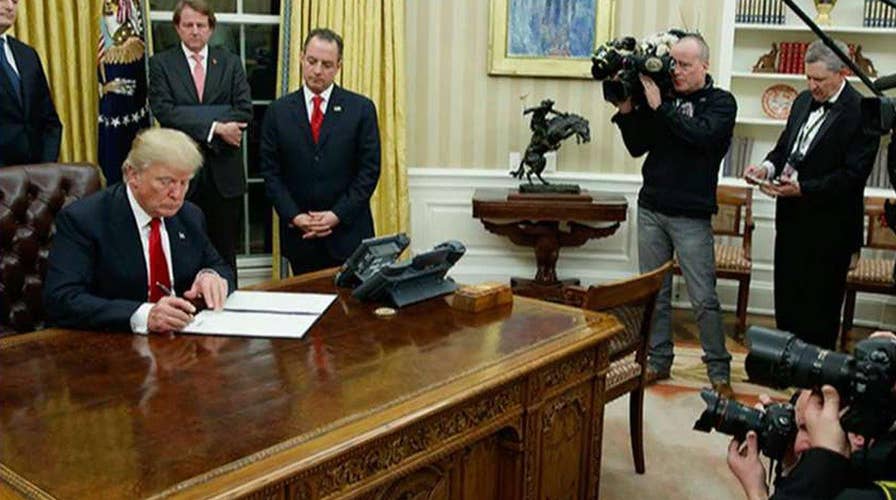Trump signs order for agencies to ease burden of ObamaCare
Byron York of the Washington Examiner explains this executive action on 'America's Newsroom'
President Trump used his first executive order late Friday to immediately undercut his predecessor’s signature health care law, ordering federal agencies to ease the “regulatory burdens” of ObamaCare -- a move that could be aimed at rolling back the law’s so-called individual mandate.
The requirement to buy insurance is one of the more unpopular components of the law. Trump’s order stated clearly that his policy is to seek the “prompt repeal” of the Affordable Care Act, but also said his directive to agencies in the meantime is meant to minimize the economic impact of the law.
The order stated that relevant agency heads “shall exercise all authority and discretion available to them to waive, defer, grant exemptions from, or delay the implementation of any provision or requirement of the Act that would impose a fiscal burden on any State or a cost, fee, tax, penalty, or regulatory burden on individuals, families, healthcare providers, health insurers, patients, recipients of healthcare services, purchasers of health insurance, or makers of medical devices, products, or medications.”
The language does not specifically cite the individual mandate -- which was at the center of the Supreme Court battle under the Obama administration that ultimately left the law in place -- but was seen as a potential swipe at that provision, among others.
"It's a sign that the Trump administration is looking to unwind the law in every way it can administratively," said Larry Levitt of the Kaiser Family Foundation, a nonpartisan clearinghouse for information and analysis about the health care system.
One distinct possibility is for the government to find new ways to grant exemptions from the law's requirement that people who remain uninsured pay fines, if deemed able to afford coverage. For example, GOP lawmakers in Congress have proposed an exemption for people in areas where only one insurer offers coverage -- currently about a third of U.S. counties.
House Democratic Leader Nancy Pelosi said in a statement Saturday that the order indeed “appears to target the individual mandate.”
The California Democrat, a staunch supporter of the law, warned: “When President Trump threatens the individual mandate, he threatens the affordable health coverage of the millions of Americans with pre-existing conditions.”
It may take weeks or months to discern the full impact of Trump's directive. Departments like Health and Human Services and Treasury will have to issue policies that embody the new president's wishes.
The executive order may not have much impact for 2017, since government rules for this year have already been incorporated into contracts signed with insurance companies.
Leslie Dach, campaign director of the Protect Our Care Coalition, issued a statement saying, "While President Trump may have promised a smooth transition, the Executive Order does the opposite, threatening disruption for health providers and patients." He called the executive order "irresponsible."
Trump made clear he is not unilaterally suspending the Affordable Care Act. It remains on the books, and his directive instructs agencies to act within "the maximum extent permitted by law."
Changing the underlying law would require Congress to act, but the Trump administration can rewrite regulations carrying out the legislation. New regulations cannot be issued overnight, but would have to follow a legally established process that requires public notice and an opportunity for interested parties to comment on the administration's changes.
Trump's order also directed agency heads to "encourage the development of a free and open market in interstate commerce for the offering of healthcare services and health insurance," a key component of Republicans' ObamaCare replacement plan.
Simultaneously, White House Chief of Staff Reince Priebus directed agencies Friday not to submit any new regulations to be published in the Federal Register unless a Trump-selected agency head approves it. The memo is similar to one that Obama's chief of staff issued the day Obama was inaugurated in 2009.
Most of Trump's first substantive acts as president will wait until Monday, his first full work day at the White House.
The Associated Press contributed to this report.





